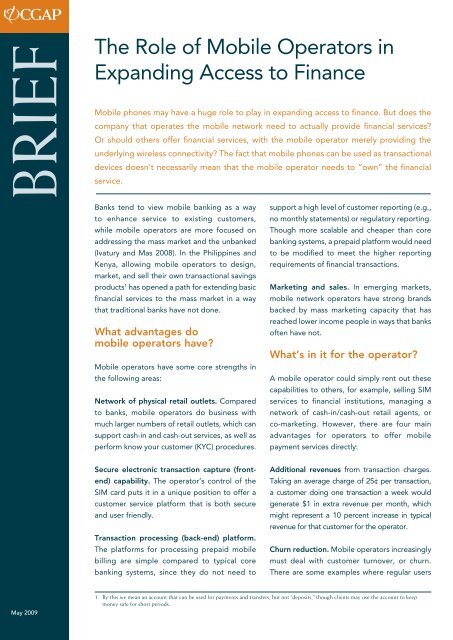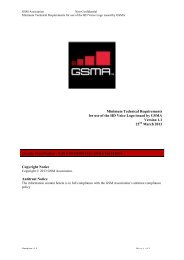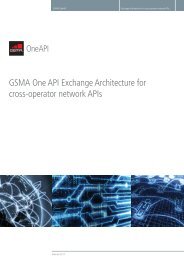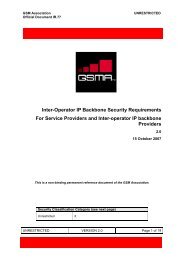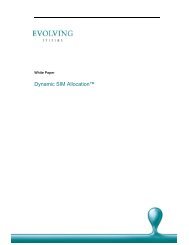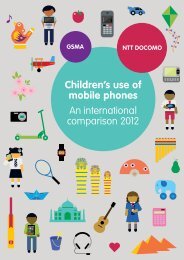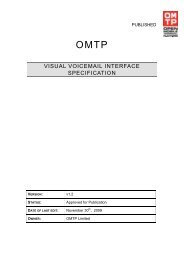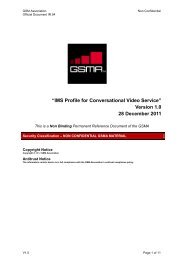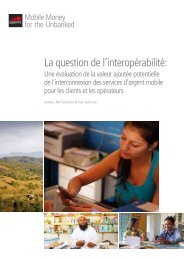The Role of Mobile Operators in Expanding Access - GSMA
The Role of Mobile Operators in Expanding Access - GSMA
The Role of Mobile Operators in Expanding Access - GSMA
You also want an ePaper? Increase the reach of your titles
YUMPU automatically turns print PDFs into web optimized ePapers that Google loves.
BRIEF<br />
May 2009<br />
<strong>The</strong> <strong>Role</strong> <strong>of</strong> <strong>Mobile</strong> <strong>Operators</strong> <strong>in</strong><br />
Expand<strong>in</strong>g <strong>Access</strong> to F<strong>in</strong>ance<br />
<strong>Mobile</strong> phones may have a huge role to play <strong>in</strong> expand<strong>in</strong>g access to fi nance. But does the<br />
company that operates the mobile network need to actually provide fi nancial services?<br />
Or should others <strong>of</strong>fer fi nancial services, with the mobile operator merely provid<strong>in</strong>g the<br />
underly<strong>in</strong>g wireless connectivity? <strong>The</strong> fact that mobile phones can be used as transactional<br />
devices doesn’t necessarily mean that the mobile operator needs to “own” the fi nancial<br />
service.<br />
Banks tend to view mobile bank<strong>in</strong>g as a way<br />
to enhance service to exist<strong>in</strong>g customers,<br />
while mobile operators are more focused on<br />
address<strong>in</strong>g the mass market and the unbanked<br />
(Ivatury and Mas 2008). In the Philipp<strong>in</strong>es and<br />
Kenya, allow<strong>in</strong>g mobile operators to design,<br />
market, and sell their own transactional sav<strong>in</strong>gs<br />
products1 has opened a path for extend<strong>in</strong>g basic<br />
f<strong>in</strong>ancial services to the mass market <strong>in</strong> a way<br />
that traditional banks have not done.<br />
What advantages do<br />
mobile operators have?<br />
<strong>Mobile</strong> operators have some core strengths <strong>in</strong><br />
the follow<strong>in</strong>g areas:<br />
Network <strong>of</strong> physical retail outlets. Compared<br />
to banks, mobile operators do bus<strong>in</strong>ess with<br />
much larger numbers <strong>of</strong> retail outlets, which can<br />
support cash-<strong>in</strong> and cash-out services, as well as<br />
perform know your customer (KYC) procedures.<br />
Secure electronic transaction capture (frontend)<br />
capability. <strong>The</strong> operator’s control <strong>of</strong> the<br />
SIM card puts it <strong>in</strong> a unique position to <strong>of</strong>fer a<br />
customer service platform that is both secure<br />
and user friendly.<br />
Transaction process<strong>in</strong>g (back-end) platform.<br />
<strong>The</strong> platforms for process<strong>in</strong>g prepaid mobile<br />
bill<strong>in</strong>g are simple compared to typical core<br />
bank<strong>in</strong>g systems, s<strong>in</strong>ce they do not need to<br />
support a high level <strong>of</strong> customer report<strong>in</strong>g (e.g.,<br />
no monthly statements) or regulatory report<strong>in</strong>g.<br />
Though more scalable and cheaper than core<br />
bank<strong>in</strong>g systems, a prepaid platform would need<br />
to be modified to meet the higher report<strong>in</strong>g<br />
requirements <strong>of</strong> f<strong>in</strong>ancial transactions.<br />
Market<strong>in</strong>g and sales. In emerg<strong>in</strong>g markets,<br />
mobile network operators have strong brands<br />
backed by mass market<strong>in</strong>g capacity that has<br />
reached lower <strong>in</strong>come people <strong>in</strong> ways that banks<br />
<strong>of</strong>ten have not.<br />
What’s <strong>in</strong> it for the operator?<br />
A mobile operator could simply rent out these<br />
capabilities to others, for example, sell<strong>in</strong>g SIM<br />
services to f<strong>in</strong>ancial <strong>in</strong>stitutions, manag<strong>in</strong>g a<br />
network <strong>of</strong> cash-<strong>in</strong>/cash-out retail agents, or<br />
co-market<strong>in</strong>g. However, there are four ma<strong>in</strong><br />
advantages for operators to <strong>of</strong>fer mobile<br />
payment services directly:<br />
Additional revenues from transaction charges.<br />
Tak<strong>in</strong>g an average charge <strong>of</strong> 25¢ per transaction,<br />
a customer do<strong>in</strong>g one transaction a week would<br />
generate $1 <strong>in</strong> extra revenue per month, which<br />
might represent a 10 percent <strong>in</strong>crease <strong>in</strong> typical<br />
revenue for that customer for the operator.<br />
Churn reduction. <strong>Mobile</strong> operators <strong>in</strong>creas<strong>in</strong>gly<br />
must deal with customer turnover, or churn.<br />
<strong>The</strong>re are some examples where regular users<br />
1 By this we mean an account that can be used for payments and transfers, but not “deposits,” though clients may use the account to keep<br />
money safe for short periods.
2<br />
<strong>of</strong> payments services stop switch<strong>in</strong>g mobile<br />
operators once they are familiar with how the<br />
service works and have a bank account l<strong>in</strong>ked<br />
to their mobile phone number.<br />
Brand<strong>in</strong>g. Be<strong>in</strong>g first-to-market could help<br />
augment an operator’s brand position<strong>in</strong>g based<br />
on customer service and <strong>in</strong>novation.<br />
Distribution cost reduction. <strong>Operators</strong> <strong>in</strong>cur<br />
substantial costs collect<strong>in</strong>g revenue from their<br />
customers.<br />
Options for mobile operators<br />
<strong>in</strong> f<strong>in</strong>ancial services delivery<br />
At the most basic level, a mobile operator<br />
can <strong>of</strong>fer secure communications services to<br />
f<strong>in</strong>ancial service providers, enabl<strong>in</strong>g transactions.<br />
This places the mobile operator <strong>in</strong> the role <strong>of</strong><br />
relay<strong>in</strong>g messages between the provider and<br />
customer.<br />
<strong>Mobile</strong> wallet services are like a real wallet—a<br />
“conta<strong>in</strong>er” to manage f<strong>in</strong>ancial transactions. Socalled<br />
m-wallets manage the flow <strong>of</strong> transactions<br />
between accounts as directed by the mobile<br />
customer.<br />
<strong>The</strong> next step is for the mobile operator to<br />
host the accounts <strong>of</strong> these third parties and<br />
to authorize transactions on their behalf. With<br />
account host<strong>in</strong>g services, the accounts are held<br />
<strong>in</strong> the name <strong>of</strong> a third-party <strong>in</strong>stitution that keeps<br />
the float, but account management is delegated<br />
to the mobile operator.<br />
<strong>The</strong> next level <strong>in</strong> the value cha<strong>in</strong> is for the mobile<br />
transactions provider to also issue accounts<br />
where value can be stored before or after the<br />
transaction. <strong>The</strong> mobile operator is the account<br />
issuer, and becomes a f<strong>in</strong>ancial service provider.<br />
<strong>The</strong>se are prepaid or electronic money or simply<br />
mobile accounts2 —basic transactional deposit<br />
accounts accessible from a mobile phone.<br />
A mobile bank<strong>in</strong>g capability would be one that<br />
goes beyond mak<strong>in</strong>g and receiv<strong>in</strong>g payments,<br />
enabl<strong>in</strong>g the end user to manage on-demand<br />
sav<strong>in</strong>gs balances and potentially use a broader<br />
range <strong>of</strong> products that allow for safe storage <strong>of</strong><br />
value, as well as credit and <strong>in</strong>surance.<br />
Figure 1 shows various value cha<strong>in</strong> segments<br />
that go from the pure telecoms provider (only<br />
normal connectivity services) to the mobile<br />
operator becom<strong>in</strong>g a (authorized or de facto)<br />
f<strong>in</strong>ancial <strong>in</strong>stitution.<br />
What should operators<br />
watch out for?<br />
Despite their advantages, mobile operators<br />
also have some capacity gaps when it comes<br />
to <strong>of</strong>fer<strong>in</strong>g a mobile payments service. For<br />
example, ma<strong>in</strong>ta<strong>in</strong><strong>in</strong>g the <strong>in</strong>tegrity <strong>of</strong> a payments<br />
system demands strong <strong>in</strong>ternal controls at the<br />
customer front end. Such controls are relatively<br />
weak for prepaid airtime resellers. <strong>Mobile</strong> sales<br />
channels support a simple, s<strong>in</strong>gle-product sale<br />
(voice); they might f<strong>in</strong>d it difficult to position a<br />
more complex product that requires a higher<br />
level <strong>of</strong> effort both to sell and use. <strong>The</strong>re are<br />
four fundamental risks:<br />
1. Breaches <strong>in</strong> data and transactional security.<br />
Breaches <strong>in</strong> data privacy, account<strong>in</strong>g errors,<br />
or fraudulent transactions could expose<br />
an operator to large liabilities and serious<br />
reputational damage.<br />
2 Some people refer to these accounts as the mobile wallet. We prefer to call it a mobile account sitt<strong>in</strong>g <strong>in</strong>side a mobile wallet.
Figure 1: Value cha<strong>in</strong> options for a mobile operator <strong>in</strong> the delivery <strong>of</strong> mobile transactions<br />
<strong>Role</strong> <strong>of</strong><br />
mobile<br />
operator <strong>in</strong><br />
deliver<strong>in</strong>g<br />
f<strong>in</strong>ancial<br />
services<br />
Examples<br />
<strong>of</strong> who is<br />
do<strong>in</strong>g it<br />
Key mobile<br />
operator<br />
strengths<br />
Value to<br />
mobile<br />
operator<br />
Potential<br />
risks for<br />
operator<br />
Telecoms<br />
bus<strong>in</strong>ess<br />
Secure<br />
communications<br />
•<br />
Any bank do<strong>in</strong>g WAP<br />
•<br />
WIZZIT (+ Bank<br />
Athens + all mobile<br />
operators, S. Africa)<br />
•<br />
Barclays (+ all mobile<br />
operators, India)<br />
•<br />
Ubiquitous wireless<br />
network<br />
•<br />
SIM security<br />
• Driv<strong>in</strong>g additional<br />
data traffic (support<br />
core bus<strong>in</strong>ess)<br />
•<br />
Network security<br />
breach<br />
2. Operational focus. <strong>The</strong> complex delivery <strong>of</strong><br />
f<strong>in</strong>ancial services could distract management<br />
from its core communications bus<strong>in</strong>ess,<br />
perhaps stretch<strong>in</strong>g the abilities <strong>of</strong> smaller<br />
mobile operators.<br />
3. Additional regulation. <strong>Operators</strong> may<br />
not want to add f<strong>in</strong>ancial regulation and<br />
supervision to the substantial regulatory<br />
oversight they already receive.<br />
4. Customer care costs. For help, many (if not<br />
most) customers would call the operator.<br />
Frequent calls could easily wipe out service<br />
pr<strong>of</strong>itability <strong>of</strong> service delivery to many<br />
customers.<br />
Summ<strong>in</strong>g up the mobile<br />
operator’s perspective<br />
<strong>Mobile</strong> wallet<br />
(presentation)<br />
services<br />
•<br />
Control <strong>of</strong> user<br />
<strong>in</strong>terface<br />
•<br />
Handset provision<strong>in</strong>g<br />
• Creat<strong>in</strong>g customer<br />
stick<strong>in</strong>ess (churn<br />
reduction)<br />
• Unsatisfactory<br />
customer experience<br />
•<br />
Handset security<br />
breach<br />
<strong>Mobile</strong> operators have comparative advantages<br />
<strong>in</strong> the creation <strong>of</strong> a mobile payments service.<br />
<strong>The</strong> bus<strong>in</strong>ess case for such service <strong>in</strong>cludes<br />
Co-market<strong>in</strong>g, co-brand<strong>in</strong>g<br />
Account host<strong>in</strong>g<br />
& transaction<br />
authorization<br />
• Smart Money (Smart<br />
+ Banco de Oro,<br />
Philipp<strong>in</strong>es)<br />
• MTN Bank<strong>in</strong>g (MTN +<br />
Standard Bank,<br />
S. Africa)<br />
• Familiarity with realtime<br />
prepaid platform<br />
• Cash <strong>in</strong>/out po<strong>in</strong>ts<br />
• Generat<strong>in</strong>g additional<br />
service revenues<br />
• Brand<strong>in</strong>g, <strong>in</strong>novation<br />
reduc<strong>in</strong>g customer churn, <strong>in</strong>creas<strong>in</strong>g revenue<br />
per customer, and avoid<strong>in</strong>g the expense <strong>of</strong><br />
distribut<strong>in</strong>g prepaid cards. <strong>Mobile</strong> operators<br />
have a further advantage over banks: their<br />
exist<strong>in</strong>g customer base <strong>in</strong>cludes a large number<br />
<strong>of</strong> unbanked people, and hence they can<br />
convert users among their exist<strong>in</strong>g base rather<br />
than need<strong>in</strong>g to acquire new customers. A bank,<br />
on the other hand, would have to reach beyond<br />
established customer segments to <strong>of</strong>fer mobile<br />
bank<strong>in</strong>g, justify<strong>in</strong>g it on <strong>in</strong>cremental revenues.<br />
Reference<br />
Own market<strong>in</strong>g, brand<strong>in</strong>g<br />
Retail distribution network (for cash transactions)<br />
Account<br />
issuance<br />
Bank<strong>in</strong>g<br />
bus<strong>in</strong>ess<br />
•<br />
G–Cash (Globe,<br />
Philipp<strong>in</strong>es)<br />
•<br />
M-PESA (Safaricom,<br />
Kenya)<br />
•<br />
M-Paisa (Roshan,<br />
Afghanistan)<br />
• Large customer base<br />
• Brand, customer trust<br />
• Solid f<strong>in</strong>ancials<br />
• Bus<strong>in</strong>ess diversification<br />
(entry <strong>in</strong>to adjacent<br />
sector)<br />
•<br />
Account<strong>in</strong>g error, fraud • Investment risk (loss <strong>of</strong><br />
•<br />
Breach <strong>of</strong> client data value <strong>of</strong> accounts)<br />
confidentiality<br />
• Application <strong>of</strong> bank<strong>in</strong>g<br />
• De-focus<strong>in</strong>g -<br />
regulations<br />
Ivatury, Gautam, and Ignacio Mas. “<strong>The</strong> Early<br />
Experience with Branchless Bank<strong>in</strong>g.” Focus<br />
Note 46. Wash<strong>in</strong>gton, D.C.: CGAP.<br />
3
AUTHORS<br />
Ignacio Mas and Jim Rosenberg<br />
May 2009<br />
All CGAP publications<br />
are available on the<br />
CGAP Web site at<br />
www.cgap.org.<br />
CGAP<br />
1818 H Street, NW<br />
MSN P3-300<br />
Wash<strong>in</strong>gton, DC<br />
20433 USA<br />
Tel: 202-473-9594<br />
Fax: 202-522-3744<br />
Email:<br />
cgap@worldbank.org<br />
© CGAP, 2009


